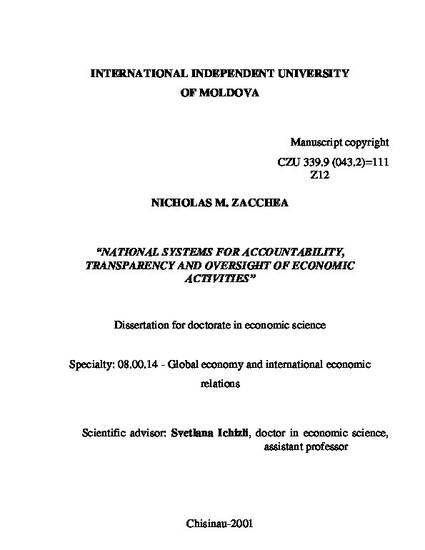
Dissertation
National Systems for Accountability, Transparency and Oversight of Economic Activities
(2001)
Abstract
National systems for audit and control (NSAC) are internationally situated in virtually every country in the entire world. Such national systems, variously referred to by such names as national audit offices, audit commissions, accounting chambers, audit bureaus and universally known as supreme audit institutions, are usually a part of the legislative branch of government. In that capacity these NSAC’s can play an important role in the governing process. It is universally understood that NSAC offices can serve to make positive contributions to government through their efforts in assuring accountability, transparency, and oversight, and thus to assist in enhancing economic conditions in their respective countries.
Usually legislatively created, each NSAC office is similar, but at the same time unique with respect to each of their counterparts in the international community. They are similar in the nature and the purpose of what is acknowledged to be the function of helping to provide accountability, transparency, and oversight of state budgets by auditing public receipts and expenditures and recommending ways that governments may improve economic conditions. They have been defined as a “…public body of a state which, however designated, constituted, or organized, exercises by virtue of law, the highest public auditing of the state." [78, pp.36-41]
They are each unique because of the way each office is organized, structured, and managed to carry out its responsibilities. Accordingly, the nature of the contribution each national audit office is able to make to government by helping to assure accountability, transparency, and oversight, is also unique.
Because they are all dispersed throughout the international community, all are operationally structured differently. Some may be more effective than others. Some may believe that they are organized to effectively and substantially contribute to government. However, in fact they may be perceived by the community of professional accountants, auditors, and other members of the international community as not entirely consequential to the process of governing, or more particularly helping to assure a vital and healthy economy. If an NSAC office does not enjoy a sufficient level of creditability and integrity among the international community of professionals, that lack of perceived creditability and integrity may ultimately inhibit its ability to significantly influence government and preclude it from making important contributions to government in its efforts to maximize the positive economic effects of its decisions.
Research revealed that there have been no comprehensive efforts to identify universal operating characteristics that can positively contribute to the ability of these internationally dispersed offices to carry out their responsibilities and make positive contributions to a country's economic conditions. Several comparative studies have been done, but none have addressed the issue of internationally accepted operating characteristics. No study has included the development of a model which incorporates such characteristics, and which can be used in objectively assessing the capabilities of these offices.
Evidence suggests that this research is necessary. Research indicated that differences in the way the community of internationally dispersed national audit offices are organized to carry out their mission have been recognized. In that regard, attempts are being made to harmonize the work of these offices throughout the world so as to make them more effective; this research will contribute to those efforts.
NSAC offices also recognize the need to become increasingly effective in view of the economic, social, political and other problems these offices and their respective governments face and that must be solved. Because there is no internationally accepted NASC office model and thus no international standard with which to compare an NSAC office's operational structure, it is difficult to objectively assess the manner in which NSAC offices carry out their missions throughout the world.
Significantly, this research was needed to identify discrete organizational components that are important to all NSAC offices in their efforts to influence government, and improve its economic status. The identification and validation of these components would permit the development of a model comprising these components. This model could then be used to objectively and scientifically assess the operations of all NSAC offices in the international community.
Importantly, the results of this research can be used to provide these NSAC offices and others in the international community, with a way to assess the manner in which these offices are organized and operated. It can also serve to present NSAC offices with options for improved performance, problem resolution, and participation in a nation’s efforts to improve its economy. The model resulting from this research will allow every NSAC office throughout the world to be compared with each of the others in the international community, and permit NSAC offices to perform self-assessments and make improvements to their management and operations. These improvements will make these offices more effective in supporting government efforts to build healthy economies. Research results will also allow NSAC offices and others in the international community to consider the relationship of economic conditions in its country with the extent to which its NSAC office conforms to the model that resulted from this research.
Disciplines
Publication Date
2001
Degree
Doctorate in Economic Science
Field of study
Global economy and international economic relations
Advisors
Scientific advisor: Svetlana Ichizli, doctor in economic science, assistant professor
Comments
Copyright 2001 NICHOLAS M. ZACCHEA
Citation Information
Nicholas M Zacchea. "National Systems for Accountability, Transparency and Oversight of Economic Activities" (2001) Available at: http://works.bepress.com/nick-zacchea/45/